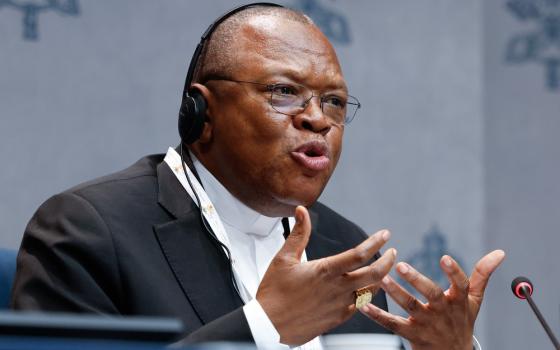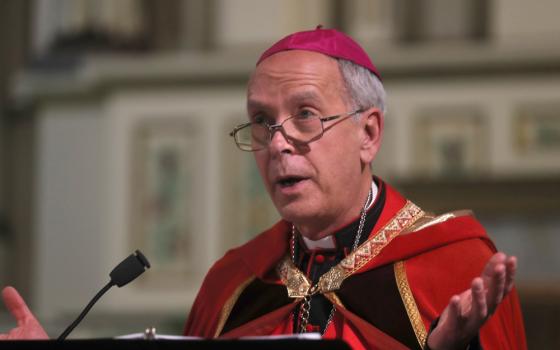
The National Pastoral Life Center in New York, a major force in Catholic sociological analysis and pastoral development of U.S. parish leadership and lay ministry over the past 25 years, announced Nov. 13 that it is closing its doors at the end of November.
The direction of the Catholic Common Ground Initiative will be transferred from the defunct NPLC to the Bernardin Center for Theology and Ministry at the Catholic Theological Union in Chicago.
The common ground initiative -- a national effort launched by Cardinal Joseph L. Bernardin of Chicago just months before his death in 1996 to unite U.S. Catholics on their common grounds of faith and to end their growing polarization over secondary church issues -- had operated under NPLC direction since 1996.
A news release from Catholic Theological Union quotes Cardinal Francis George of Chicago saying that the initiative is "coming home to Chicago." The move is effective Nov. 14, the 13th anniversary of Bernardin's death.
Church, the NPLC periodical devoted to the study of issues in parish life, church ministries and related fields, suspended publication with its September issue.
Msgr. Philip J. Murnion, a New York archdiocesan priest and sociologist, founded the NPLC in 1983 to study and advance the development of parish ministry in a changing U.S. church. He directed it until his death from cancer in 2003.
Several of the center’s sociological studies of the extent and nature of lay ministry in U.S. Catholic parishes played a key role in determining how the country’s bishops addressed the issue of ecclesial lay ministry, theologically and practically, as an integral part of current developments in the U.S. church.
In the mid 1990s Murnion and Bernardin collaborated closely in developing the Catholic Common Ground Initiative. The initiative sought to expand a shared vision of a U.S. church that was more united by their members’ common bonds of faith than it was divided by the then growing (and still present) Kulturkampf, or cultural warfare, between the country’s liberal and conservative Catholic factions,
The initiative was launched Aug. 12, 1996, with a 3,000-word statement, titled “Called To Be Catholic,” that said that “a dynamic of fear and polarization” and an atmosphere of “distrust, acrimony and deadlock” were undermining the vitality and power of U.S. Catholicism.
The statement called for U.S. Catholics with differing views to come together in constructive dialogue, emphasizing their common faith and commitment, and to again devote their energies to the central tasks of building the church and strengthening its institutions, mission and witness to the world.
As soon as the initiative was announced in 1996 it was sharply criticized by Cardinals Bernard F. Law of Boston and James A. Hickey of Washington. They described “Called To Be Catholic” as an unacceptable invitation for the church to dialogue with dissident Catholics on undebatable matters.
“Dissent from revealed truth or the authoritative teaching of the church cannot be ‘dialogued’ away,” Law said in a statement. “Truth and dissent from truth are not equal partners in ecclesial dialogue.”
In a separate statement, Hickey said, “We cannot achieve church unity by accommodating those who dissent from church teaching.”
“Called To Be Catholic” itself had no language advocating dialogue or compromise over matters of church doctrine, but the immediate strong criticisms of the two East Coast cardinals set a context in which all media reports of the initiative intimated some questions over its doctrinal integrity in the church.
Within days after the hierarchical controversy over the common ground initiative arose, this reporter learned confidentially from reliable sources (but has not previously reported) that Bernardin, following common ecclesiastical courtesy of the time, had alerted his fellow American cardinals beforehand of his planned initiative and forwarded to them the “Called To Be Catholic” statement he was about to issue.
According to those sources, Law and Hickey were then vacationing on Cape Cod with American Cardinal William W. Baum -- former archbishop of Washington, then prefect of the Vatican’s Congregation for Catholic Education and one of the highest-placed Vatican officials from the United States, who was entirely unfriendly to progressive trends in the U.S. church.
The attacks on the Catholic Common Ground Initiative by Law and Hickey plagued it from its beginning. Despite its modest successes and unfailing demonstrations of loyalty to church teaching in the intervening 13 years, neither of the initially critical cardinals has ever revoked his first-glance condemnations.
Murnion began the National Pastoral Life Center as a New York archdiocesan organization but soon transformed it into a national research center.
It was perhaps best known in inner church circles for its consultation programs in dioceses across the nation to help improve pastoral ministry in numerous ways -- from more effective methods of ministry by pastors to integrating the growing role of lay ministry into parish life.
On the national level, the center’s landmark research on the growing role of lay ecclesial ministry in the church had a significant effect on church practices and policies. In a 2007 study it reported for the first time that the number of paid lay ministers employed in U.S. Catholic parishes, 29,000, exceeded the 27,000 priests employed at least part time in those parishes. Since then the number of lay ministers has grown while the number of priests has continued to decline.
In announcing its closing, the NPLC said it was “a unanimous decision by the board of directors.”
When the center was formed a quarter-century ago, “we never imagined a time when so many of our initiatives would become integrated into the way Catholics in the United States practice their faith and serve the church,” it said.
[Jerry Filteau is NCR Washington correspondent.]

